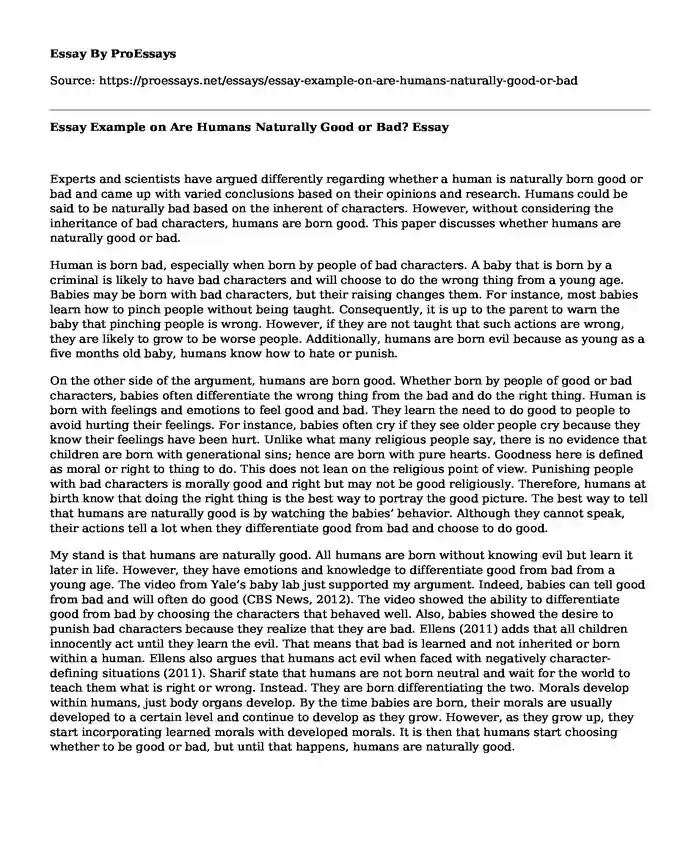Experts and scientists have argued differently regarding whether a human is naturally born good or bad and came up with varied conclusions based on their opinions and research. Humans could be said to be naturally bad based on the inherent of characters. However, without considering the inheritance of bad characters, humans are born good. This paper discusses whether humans are naturally good or bad.
Human is born bad, especially when born by people of bad characters. A baby that is born by a criminal is likely to have bad characters and will choose to do the wrong thing from a young age. Babies may be born with bad characters, but their raising changes them. For instance, most babies learn how to pinch people without being taught. Consequently, it is up to the parent to warn the baby that pinching people is wrong. However, if they are not taught that such actions are wrong, they are likely to grow to be worse people. Additionally, humans are born evil because as young as a five months old baby, humans know how to hate or punish.
On the other side of the argument, humans are born good. Whether born by people of good or bad characters, babies often differentiate the wrong thing from the bad and do the right thing. Human is born with feelings and emotions to feel good and bad. They learn the need to do good to people to avoid hurting their feelings. For instance, babies often cry if they see older people cry because they know their feelings have been hurt. Unlike what many religious people say, there is no evidence that children are born with generational sins; hence are born with pure hearts. Goodness here is defined as moral or right to thing to do. This does not lean on the religious point of view. Punishing people with bad characters is morally good and right but may not be good religiously. Therefore, humans at birth know that doing the right thing is the best way to portray the good picture. The best way to tell that humans are naturally good is by watching the babies’ behavior. Although they cannot speak, their actions tell a lot when they differentiate good from bad and choose to do good.
My stand is that humans are naturally good. All humans are born without knowing evil but learn it later in life. However, they have emotions and knowledge to differentiate good from bad from a young age. The video from Yale’s baby lab just supported my argument. Indeed, babies can tell good from bad and will often do good (CBS News, 2012). The video showed the ability to differentiate good from bad by choosing the characters that behaved well. Also, babies showed the desire to punish bad characters because they realize that they are bad. Ellens (2011) adds that all children innocently act until they learn the evil. That means that bad is learned and not inherited or born within a human. Ellens also argues that humans act evil when faced with negatively character-defining situations (2011). Sharif state that humans are not born neutral and wait for the world to teach them what is right or wrong. Instead. They are born differentiating the two. Morals develop within humans, just body organs develop. By the time babies are born, their morals are usually developed to a certain level and continue to develop as they grow. However, as they grow up, they start incorporating learned morals with developed morals. It is then that humans start choosing whether to be good or bad, but until that happens, humans are naturally good.
Conclusion
In conclusion, the human is naturally good. Although it may be argued otherwise with character-based evidence, humans are good at the beginning. The inherited character defines people when they choose to emulate behaviors, and this time, they may emulate good or bad habits. Babies are born with feelings and with knowledge of wrong and right. They, therefore, often choose good just as directed by their emotions. As they develop alongside their morals, they may learn more good or bad behaviors.
References
CBS News. (2012, November 18). Born Good? Babies help Unlock the Origins of Morality [Video]. YouTube. https://www.youtube.com/watch?v=FRvVFW85IcU
Ellens, J. H. (2011). Are We Basically Good or Evil, Fallen, or Underevolved?. Explaining Evil [3 volumes], 314. https://books.google.com/books?hl=en&lr=&id=E4_jAxfgteoC&oi=fnd&pg=PA314&dq=Is+human+nature+basically+good+or+bad%3F&ots=5pvaXQMz4O&sig=Bs3q_ytwZoM09dSzvqBaeKjVEkE
Sharif, R. H. (n.d). All Humans Are Basically Good. https://www.researchgate.net/profile/Rafiqul_Sharif/publication/322592890_ALL_HUMANS_ARE_BASICALLY_GOOD_-_A_critical_evaluation_in_light_of_evidence_from_psychological_literature_and_Islamic_sources/links/5a6199ad4585158bca4a0b14/ALL-HUMANS-ARE-BASICALLY-GOOD-A-critical-evaluation-in-light-of-evidence-from-psychological-literature-and-Islamic-sources
Cite this page
Essay Example on Are Humans Naturally Good or Bad?. (2023, Sep 11). Retrieved from https://proessays.net/essays/essay-example-on-are-humans-naturally-good-or-bad
If you are the original author of this essay and no longer wish to have it published on the ProEssays website, please click below to request its removal:
- The Overall Synopsis of the Book
- Ethical Considerations and Possible Research Questions for the CEOs and Employees
- Ethical Values and Challenges in Decision Making Paper Example
- Ethical Challenges of a Global Supply Chain, Analysis and Recommendations Paper Example
- Essay Sample on Explaining the Enduring Resonance of the Hart-Fuller Debate
- Moral Sensitivity: Recognizing Problems & Consequences - Free Essay Sample
- Free Report on Growing Up Trans: Daniel's Journey of Self-Discovery







